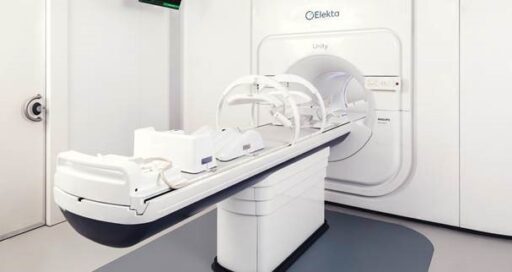Learn more about radiotherapy for prostate cancer and whether this treatment may be suitable for your situation.
Radiotherapy, or radiation therapy, is a cancer treatment that uses focused and targeted radiation (such as X-rays) to kill or damage cancer cells so they can’t grow or spread.
Radiation therapy can be delivered:
Radiation Oncologists are the cancer specialists who oversees this treatment, and they work closely with Radiation Therapists in its delivery. Radiation Oncology Nurses will also be involved in your care.

External beam radiotherapy uses a device called a medical linear accelerator (linac) to kill or damage tumours. The technique is not invasive, and most people can continue their normal activities during their treatment.
As well as conventional linac treatment, St Vincent’s also offers a new technology, the MR-Linac. This specialised option combines high-resolution magnetic resonance imaging (MRI) techniques with extremely precise radiation therapy. It can mean fewer treatments and, potentially, reduced side effects.
However, not all patients with prostate cancer will benefit from MR-Linac treatment. The technique is mostly beneficial when:
Your doctor will discuss this option with you if it’s appropriate for your situation.
Brachytherapy is a targeted, internal radiation therapy where the radiation source is placed inside the body. Giving radiation doses directly to the prostate can limit potential damage to nearby tissues and organs.
There are two forms of brachytherapy. At St Vincent’s, we offer permanent brachytherapy.
Depending on what type of brachytherapy you have, you will need to take some safety precautions after your treatment. Your health care professional can give you more information.
For all forms of external beam radiotherapy, the treatment process has four stages:
Your Radiation Oncologist will review all your information and speak with you before determining an appropriate treatment plan.
GenesisCare, the largest private provider of radiotherapy services internationally, provides St Vincent’s with access to cutting-edge technology and radiotherapy services. Before your first appointment, your care team at GenesisCare Darlinghurst will explain any preparation instructions for your appointments and answer any questions you may have.
Your planning appointment will last for one to one and half hours and will involve a computed tomography (CT) scan.
If your Radiation Oncologist plans to treat you using the MRI Linac, these steps will also happen:
Over the next week, your specialist and care team will work together to develop a personalised treatment plan using advanced computer technology.
Your health care team will tell you what you need to do before treatment. Each treatment will take around 25 to 40 minutes.
For MR Linac treatments, before each treatment session:
During treatment:
The loud noises you hear during an MRI will not last the whole time. If you like, you can choose specific music or podcasts to listen to during the treatment.
During your treatment course:
After your treatment has finished:
Your MR-Linac team will continue to follow up on your recovery and wellbeing through appointments, phone calls and emails. You can contact them on 02 8302 5400.
Radiation therapy for prostate cancer may be recommended to provide:
Your health care team will advise you on whether radiotherapy is an appropriate treatment for your particular situation. Speak to them if you have any questions at all about this treatment option.
The side effects are similar for external radiation therapy and brachytherapy. Most side effects start during treatment and go away within several weeks of finishing treatment. You may experience:
Everyone experiences side effects differently, so speak to your health care professional if you are concerned about any new symptoms.


